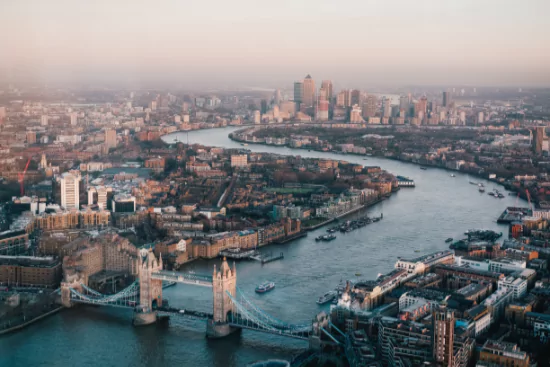Cut The Traffic: The Thames as a Solution for Southwark's Congestion Problem

The River Thames is the beating heart of London. Life has flourished along the river banks of the capital of England for millennia but also, floundered as a consequence of dwindling maritime trade, plague, war and in more recent history - Urbanisation. Traffic on the river has dropped off dramatically in the last century, whilst the traffic on land has increased to alarming levels, prompting action.
As discussions around expanding the Ultra Low Emission Zone (ULEZ) zone have taken center stage recently, the impact of traffic and congestion in the area of Southwark has once again arisen, in light of recent findings on the impact on residents mental health. It’s clear that more needs to be done to tackle the issues that vehicles cause in this part of London (and the rest of the city) but is ULEZ the only solution for reducing traffic in these areas?
What if we went back in time - not literally but in terms of how we look at London and moving around the city, and took a lesson from history and changed our approach to how we use the Thames? While private ferry companies and water taxis like Uber have made their presence felt on the river, it's essential for Southwark Council to play an active role in leveraging this waterway to its full potential, and reduce the impact from traffic on residents living in the borough.
The Potential of the Thames
Congestion is a constant struggle for urban areas, and Southwark is no exception. The bustling streets are often clogged with cars, vans, and lorries, leading to not only traffic woes but also contributing to elevated pollution levels. The pollution from exhaust emissions has a profound impact on air quality, which, in turn, affects the overall well-being of the community.
The Ultra Low Emission Zone aims to tackle this issue by setting strict emission standards for vehicles (and is proving to be increasingly unpopular as it expands), but the potential of the Thames remains relatively untapped. Enter Impact on Urban Health, an organization dedicated to exploring innovative solutions to urban challenges. Their attention has turned to the Thames as a potential route to reduce air pollution stemming from freight transportation.
By utilizing the river for transporting goods, Southwark could potentially see a significant reduction in road traffic, leading to decreased pollution levels and ultimately, improved air quality. Vans and lorries could quite easily be moved off the streets and replaced for the most part, by modern river barges and boats to reduce traffic on the streets.
The Link Between Traffic, Pollution, and Mental Health
Studies have shown a profound connection between air quality, traffic and mental health. The World Health Organization has highlighted the adverse effects of air pollution on cognitive function and mental health, including an increased risk of depression and anxiety.
The correlation between congested, polluted urban environments and rising levels of stress and mental health issues cannot be ignored. Southwark residents are not only contending with the stresses of urban life but also the additional burden of polluted air that can exacerbate these challenges.
Southwark stands at a crossroads where transportation, pollution, and mental health intersect. As the ULEZ expansion discussions continue, it's imperative for all stakeholders – residents, local authorities, organizations, and businesses – to recognize the potential of the River Thames as a solution. It's crucial for Southwark Council to take an active role in fostering the growth of schemes like those proposed by Impact On Urban Health but community involvement is just as important as council input.
Visit Marks Out Of Tenancy and Stay Connected
Platforms like Marks Out of Tenancy empower tenants to share their experiences, thereby encouraging landlords and local authorities to prioritize living conditions and foster a community dedicated to creating a better way of renting and living, for everyone.
If you're passionate about improving living conditions and mental well-being in Southwark and beyond, take action today. Visit Marks Out of Tenancy's website to share your experiences, rate landlords, and be a part of our attempts to make real change in the private rental sector.
Join the conversation on our social media profiles and stay updated on some of our initiatives that are shaping a brighter future for tenants everywhere.
https://www.marksoutoftenancy.com/
